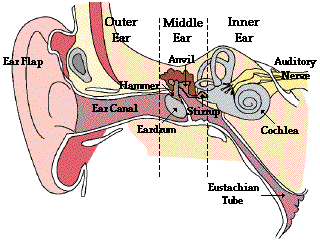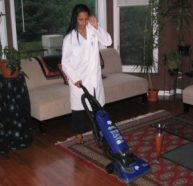Hear, Hear
Listening to loud music or playing in a rock band without ear protection can lead to hearing loss.
By Emily Sohn
Birds chirping. Waves crashing. Friends laughing. Teachers talking.
Sounds are a big part of life for people who can hear. But you probably don’t spend much time thinking about what goes on inside your ears—or about how loud sounds might affect your hearing.
 |
|
The roar of crashing waves is among the many natural sounds that we can experience. |
A recent survey on MTV’s Web site found that a mere 8 percent of young people say that hearing loss is “a very big problem.” In comparison, 45 percent of respondents thought that smoking is a major health problem, 31 percent ranked nutrition and weight issues as a priority, and 18 percent put acne near the top of the list.
While these issues are indeed important, it would do kids and teenagers a lot of good to care more about their ears, say the researchers who designed the survey. They work at the Massachusetts Eye and Ear Infirmary (MEEI), Harvard Medical School, and the Harvard School of Public Health.
One large study by scientists at the Centers for Disease Control and Prevention (CDC) found that nearly 13 percent of young people, ages 6 to 19, have some hearing loss caused by exposure to loud noise. That’s more than 5 million kids in the United States who no longer hear as well as they once did.
Most of the time, hearing loss in young people is mild or temporary, but it can be a warning sign of more serious hearing problems to come.
Noise machines
Ears, when they work well, are nifty and intricate little machines.
Sound enters the outer ear canal as a wave. The sound wave travels down the canal to the eardrum, causing it to vibrate. The eardrum, in turn, excites three little bones, which vibrate and amplify the sound. The small bones pass the sound on to the inner ear and a structure called the cochlea. The cochlea is shaped like a snail shell and filled with liquid.
 |
|
Sound waves travel down the ear canal and cause the eardrum to vibrate. The eardrum, in turn, excites three small bones (hammer, anvil, and stirrup), which amplify the sound and send it to the cochlea. |
| NASA |
Inside the cochlea are delicate structures called hair cells, which are responsible for sending electrical signals to the brain. They let the brain know that the ears have heard something. Hair cells are essential for hearing, but loud noises damage them. And, unlike cells in the skin and other parts of the body, hair cells don’t grow back.
Some researchers are trying to find ways to grow new hair cells in the lab or help the body grow its own.
Loud music
Severe hearing loss occurs most often in elderly people. But the damage happens gradually, and it often begins in childhood.
The goal of the new survey was to find out how likely kids are to experience ear damage, how much they know about hearing loss, and how willing they might be to change their habits.
 |
|
Listening regularly to loud music can affect a person’s hearing. |
The researchers used the Internet to distribute their 28-question survey because they wanted to reach a lot of young people. They used MTV’s Web site, in particular, because they guessed that people visiting this site listened to lots of music, much of it loud. In just 3 days, the scientists collected the opinions of nearly 10,000 visitors.
“This is the first study that has ever been done concerning awareness of hearing loss by kids on such a large scale,” says MEEI physician Jeannie Chung.
One surprising outcome was that 61 percent of young people who answered the survey said that they had felt ringing in their ears or had trouble hearing after a concert. These sensations by themselves usually last for just a short time before hearing returns to normal. After repeated exposure to loud music and other intense sounds, however, temporary hearing loss can become permanent.
Earplugs
One of the best ways to keep a strong sense of hearing into old age, experts say, is to keep a pair of earplugs in your pocket.
 |
|
A loud vacuum cleaner might be a good reason to wear earplugs while doing household chores. |
| E. Sohn |
If you end up stuck in a traffic jam beside a jackhammer, or standing next to the speakers at a rock concert, pop them in. Earplugs don’t change the quality of sounds, Chung says. They only dampen the noise.
“It’s like sunscreen,” she says. “One sunburn is not going to give you cancer, but multiple sunburns will.”
Noise, likewise, is okay, as long as you don’t overdo it. “We’re not saying you shouldn’t go to rock concerts or clubs or listen to loud music,” Chung says. “We’re saying that you should be aware of it. Do things to protect yourself while you’re having fun.”
One result from the MTV survey was particularly encouraging to the researchers. While only 14 percent of the young respondents said they had used earplugs to protect their ears, a full 66 percent said they would be more likely to use them if they had known about the possibility of suffering hearing loss. Fifty-nine percent said they would be more likely to use earplugs if their doctors talked to them about it.
So, now you know. You needn’t be afraid of going deaf someday. Just take care of your ears, and they’ll give you something to dance about for a long time to come.
Going Deeper:







